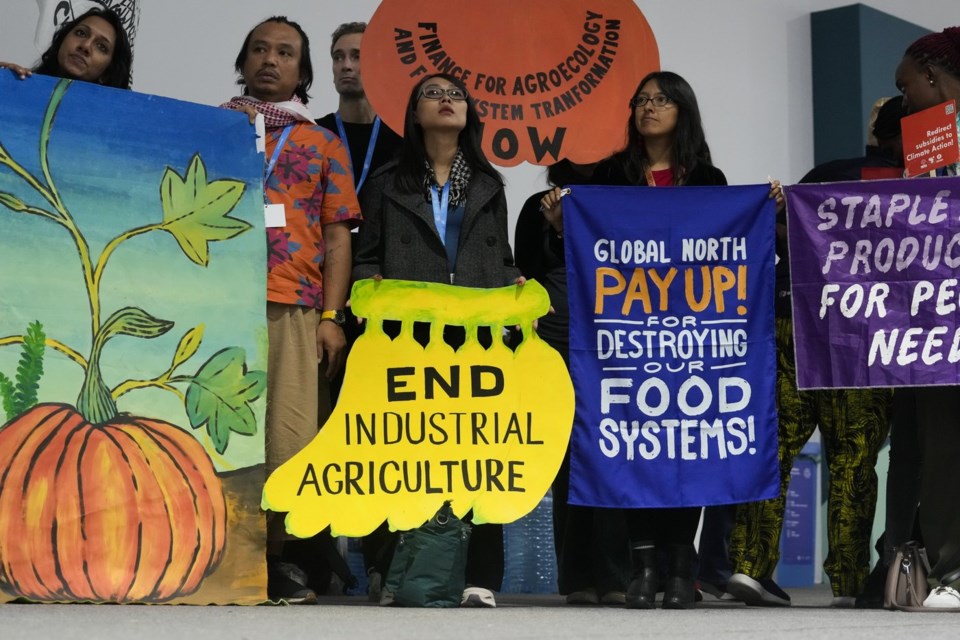BAKU, Azerbaijan (AP) — Extreme heat ruined the pineapples on Esther Penunia's small farm in the Philippines this year, more disappointment than catastrophe since Penunia doesn't depend on the farm for a living. But Penunia worries about the millions of small farmers in her part of the world who do depend on rice paddies, coconut groves and vegetable patches that are all threatened by climate change.
That’s why she’s hoping that countries at this year’s United Nations climate summit will dedicate some of the money for fighting climate change to agriculture — and the family farmers who feed most of the people in many parts of the world.
“You don’t help small farmers, where will you get your food?" wondered Penunia, secretary general of the Asian Farmers Association. "Who will farm for you? Who will catch the fish, who will get the honey, who will plant your vegetables?”
Many countries, especially in the Global South, need money to help pay for the months of recovery when typhoons wreck fields, to insure farmers against more extreme droughts and to prepare for a hotter world with better seeds, better fertilizers and better water infrastructure. But there's a massive gap between the $1 trillion in climate finance that poorer countries need, according to experts from the World Resources Institute, and what richer countries are prepared to pay.
Whatever deal is reached, it's certain that the money will have to be stretched. And there's debate about exactly how much money should go toward agriculture and how much toward cutting fossil fuel emissions.
Small farmers get less than 1% of climate finance, according to . At the same time, food systems — all the processes involved in making, shipping and disposing of food — account for
Farmers' efforts to adapt to a warming climate get harder the hotter it gets, Ismahane Elouafi, executive managing director of CGIAR, a global partnership for agricultural research, said in a statement. At a COP29 panel on climate-smart solutions for smallholder farmers, she added: “If we want to solve the issue, how could we not invest in a sector that is having a third of the problem?”
Praveena Sridhar, chief science and technical officer of Save Soil, a movement aimed at raising awareness about soil health, offered a simpler reason for why countries should help fund agriculture's adaptation to climate change. As hard as it is to agree on cutting fossil fuel use, it should be easier to support farming solutions proven to work.
“We have not figured out the puzzle yet,” she said. “Why not look at the puzzle pieces we have figured out and start moving?”
Yet others worry that doing so would distract from tackling the biggest problem — fossil fuels.
Zeke Hausfather, a research scientist with the nonprofit Berkeley Earth, said in an email that there is “real potential” in land management changes to reduce carbon dioxide emissions. But the most that could cut emissions globally is around a billion tons a year, he said — just a tiny fraction of the 40 billion tons of carbon dioxide the world emits every year.
Hausfather also noted that carbon stored in the ground by more climate-conscious agricultural practices isn't guaranteed to stay there permanently, he said, .
That hasn't stopped some countries, companies and private investors from putting big money toward agricultural technology, including the $9 billion for a joint U.S. and U.A.E.-backed project aimed at innovating in farming and food systems to adapt to climate change and cut emissions. Another $12 billion was announced for the effort this week in Baku.
With the incoming Trump administration likely to reverse many U.S. climate initiatives, Secretary of Agriculture Tom Vilsack said he hopes business, academic and farming interests keep climate-related agriculture projects going. “It’s always important to remember that we have three levels of government in the U.S. And there’s going to be a lot of activity in cities and states that’s going to complement what was being done in these initiatives that I think will continue,” Vilsack said.
The stakes are high for advocates like Penunia, who was disappointed that farmers weren't mentioned in language at the last U.N. climate talks.
“We hope that really we can be heard," she said.
___
Follow Melina Walling on X, formerly known as Twitter, @MelinaWalling.
___
The Associated Press’ climate and environmental coverage receives financial support from multiple private foundations. AP is solely responsible for all content. Find AP’s for working with philanthropies, a list of supporters and funded coverage areas at .
Melina Walling, The Associated Press




